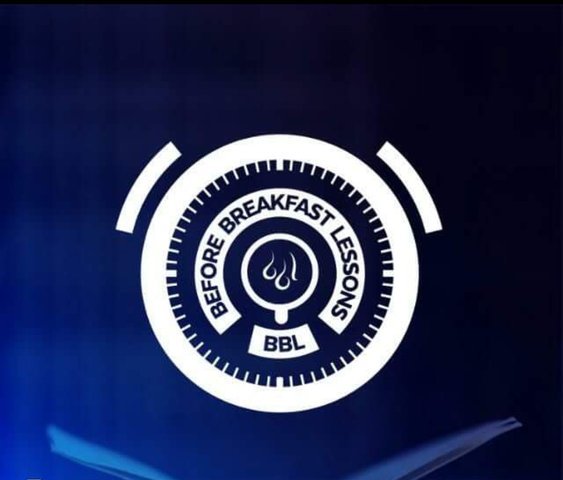Before Breakfast Lessons
😃🗣✍🏽☕🍔🍲🍞🍮☕

❇ Confusing words🤔💬💭
💠 Taught and Thought
The past tense and past participle of teach is taught.
The past tense and past participle of think is thought. A thought is also something that you think of or remember; an idea.
Taught and thought are often confused because of how they are wrongly pronounced. Taught is pronounced as /tɔːt/ while thought is pronounced as /θɔːt/. The difference is in the initial consonants /t/ and /θ/. The sound /θ/ is pronounced with the tongue at the back of the upper teeth (almost slipping in-between the upper and lower teeth) while allowing air to pass through the sides of the tongue. It is the same sound that begins the word "think".
Example
- We have been taught to be compassionate. ✅
- The thought that I think towards you is for your good. ✅
❇ Misused words/expressions❌
💠 Arm robbers
The appropriate modifier in the phrase is armed, not arm. The adjective armed means involving the use of weapons. So we have armed (not arm) forces, armed (not arm) robbery/robber. The opposite of armed is unarmed.
Example
- The armed robbers were busted last night. ✅
❇ Grammar📚
💠 Word classes (Nouns)
Subject-verb agreement
Rules
In sentences beginning with here or there, the true subject follows the verb. These types of sentences are inverted. For example: 1. Here is the map. 2. Here are the maps. The subjects "the map" and "the maps" determine whether the verb should be "is" or "are". 3. There are three people left. 4. There is one person left.
Parentheses are not part of the subject. For example: Prince (and his cousin) comes here every day. "and his cousin" is not part of the subject. It is a parenthetical phrase. 🚫Note: In writing, what is usually put in parentheses is an additional information; it can be omitted and the sentence would still make sense.
To be continued...
❇ Spell Check & Pronunciation☑
💠 Soar and sour
Soar is a verb. If the value, amount, or level of something soars, it rises very quickly. To soar (especially of birds) is to rise quickly and smoothly up into the air. Soar is pronounced as /sɔː/. It rhymes with the word "saw".
Sour, on the other hand, can be used as an adjective and as a verb. As an adjective, it means having a taste like that of lemon or fruit that is not ready to eat; having unpleasant taste or smell because it is not fresh; bitter. Sour is pronounced approximately as /sawa/ but precisely as /ˈsaʊ(ə)ɹ/.
Example
- The prices of goods soar every now and then. ✅
- The drink tastes sour. ✅
❇ Useful expressions/Idioms🆔
💠 not/never a hair out of place
To say that someone does not have a hair out of place means that their appearance is perfect.
Example
- Renee is always impeccably dressed - never a hair out of place! ✅
❇ Vocabulary building👍🏽🆕
💠 Nutmeg
Nutmeg (not nutmilk) is the hard fruit of a tropical tree, or a brown powder made from this, used as a spice to add
flavour to food.
In football, a nutmeg (this usage is informal) is an occasion when a player kicks the ball through an opponent's legs. It can also be used as a verb to mean "to kick a ball through an opponent's legs".
It is pronounced approximately as /nat meg/, and precisely as /ˈnʌt.meɡ/. It is not pronounced as /nɔt meg/.
Example
- She realised later that she didn't put nutmeg in the stew. ✅
- Who is the king of giving nutmegs in modern-day football? ✅🤣
❇ Communication (speaking & writing) Tip✅
💠 Practical appreciation of texts and speeches
Sometimes, you read a text or listen to a message and you are able to determine that the speaker is a religious person, a politician, a human right activist, a lawyer, etc.
What are the determining factors? This part of the lesson would give you the key to unlock this padlock.
Typically, every field of endeavour has its known terms and language. It is called register. Once you are able to identify some of these registers, one can read or listen beyond the ordinary text or speech to know whom the speaker is.
A religious person cannot make a sentence or two without quoting from the Quran, Bible, or mentioning issues relating to beliefs, moral laws, morality, etc. He or she will try to link everything to God, and inspire people to harness their relationship with God. A legal person will most definitely swim in constitutions, codes and conduct, acts, bills, statutes, etc. It is common to hear a legal person use Latin expressions (e.g. pro bono, etc.) and King James (Shakespearean) English (e.g. herein, etc.)
How can you determine that a person speaking is a "science" person? What about a politician?
To be continued...
.................End....................
Your language is your bargaining power so make it skilled.
Before Breakfast Lessons
® WeRise
♻we rise by lifting others
Congratulations @learningcenter! You received a personal award!
Click here to view your Board of Honor
Do not miss the last post from @steemitboard:
Congratulations @learningcenter! You received a personal award!
You can view your badges on your Steem Board and compare to others on the Steem Ranking
Vote for @Steemitboard as a witness to get one more award and increased upvotes!